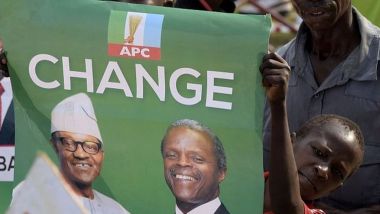President Muhammadu Buhari came to power promising Nigerians “change”. Novelist and writer Adaobi Tricia Nwaubani gives five examples of what has changed in Nigeria since 29 May 2015 when he was sworn in.
- Are we safer?
Those of us who travel regularly in Nigeria’s north-east had become used to what should be a 15-minute journey turning into an hour-long ordeal.
You had to stop dozens of times at roadblocks and disembark, while heavily armed soldiers inspected your vehicle for traces of the Islamist militant group, Boko Haram.
Today, the number of checkpoints has fallen significantly – even on the road to Chibok – thanks to enhanced confidence in the security of the entire region.
The army has regained swathes of territory that the Islamist militants had occupied as part of their so-called caliphate.
Boko Haram has been considerably weakened, resigned to attacking soft targets using suicide bombers.
Thousands of women and girls kidnapped by the group have also been rescued, including one of the 219 schoolgirls from Chibok abducted in April 2014.
But while there is progress in the north-east, trouble in the Niger Delta, the country’s oil-producing region, is resurfacing.
Recent attacks on oil facilities have caused a drop in production and helped push up the global price of crude oil.
- Where’s my money?
In the months preceding last year’s elections, the popular chant on the streets was “Sai Buhari, Sai Buhari”, which means “Only Buhari” in Hausa – the most widely-spoken language in the north where the president originates.
“Sai Buhari” became an almost magical greeting, capable of earning you a discount from the sweaty chap pushing a wheelbarrow of tiger nuts or sugar cane.
It could even elicit a smile followed by permission to move along, from the miscellaneous airport officials who usually ensure that your passage through Nigerian Customs and Immigration is fraught with agonising delays.
A year later, the chant has changed to “Buhariya”, which roughly translates to “Buhari’s way” or “Buhari’s time”.
The slogan is now used to explain every unpleasant evidence of Nigeria’s troubled economy and a time of austerity.
Q: “A basket of tomatoes has gone up from 3,000 naira ($15) to 18,000 naira?”
A It’s “Buhariya!”
Q: “How come the naira is plummeting against the dollar on the black market?”
A: It’s “Buhariya!” Where’s our money?
This time last year, friendship with Sambo Dasuki, the former national security adviser, could have altered your economic circumstances forever.
He would have been besieged with invitation cards to be the chief guest at various events.
When he entered a room, almost everyone would stand in respect.
Today, he sits in an Abuja jail, awaiting trial for the alleged mismanagement of billions of dollars meant for the war against Boko Haram – charges he denies.
Several other big men, previous untouchables, such as former service chiefs, top politicians and government officials, are also sitting in jail awaiting corruption trials, or out on bail.
And, if you’re looking for a second-hand luxury car to buy, now may be the time.
A number of people formerly linked to the government are desperate for cash and selling off their fleets.
It would seem as though the leaking taps that gushed dollars to be spent carelessly have stopped flowing since President Buhari came to power.
- Where are the women?
Ensuring women’s participation at all levels in political, economic and public life is one of the targets of the UN’s sustainable development goals (SDGs).
But oly six out of Buhari’s cabinet of 37 are women, a meagre 16% and way down on the previous administration’s 31%.
Adaobi Tricia Nwaubani:
“The president’s wife, Aisha… appears as the stereotypical good African wife.”
The president’s wife, Aisha, is also the most silent first lady Nigeria has had in decades, barely seen or heard – except maybe when she is visiting unkempt children in a refugee camp or donating food items to victims of Boko Haram. She appears as the stereotypical good African wife.
Her invisibility is suspicious when you consider that President Buhari, during his election campaign, said he would abolish the office of the first lady – but then retracted the suggestion when challenged by feminist voters.
- What are we wearing?
In Abuja the government in power influences the style of dress throughout the administration.
Staff of the government, friends of the government and aspiring friends of the government all aim to dress like the person at the top.
Northerners ruled Nigeria for most of the country’s first three decades after independence from the UK in 1960.
Over time, their traditional outfits, babarigas (flowing gowns) and kaftans, became firmly entrenched – even when a non-northerner was elected in 1999. Olusegun Obasanjo is an ethnic Yoruba from the south but throughout his eight-year presidential tenure, he mostly wore babarigas.
Cartoons depicting a typical Nigerian “big man” will usually feature him dressed in the flowing robes, his potbelly distorting the layers of cloth.
All this changed in 2011, with the election of Goodluck Jonathan.
He was Nigeria’s first president from one of the country’s smaller ethnic groups, and also the first from the oil-producing Niger Delta, in the south.
Jonathan preferred the long shirt and trouser outfit that is traditional among his Ijaw community.
Suddenly, the babariga was nowhere to be seen.
Government offices and hotel lobbies began to feature an inordinate number of men dressed in the presidential style of the time.
Some even went as far as the fedora hats and walking sticks that go with the outfit.
Eventually, the style gained its own special nickname – “resource control” – in reference to the fact that most people who wore it seemed to be the ones controlling Nigeria’s oil resources.
Indeed, it seemed to be the preferred outfit of many of Nigeria’s newest millionaires.
Not any more. Within a year of Mr Buhari, “resource control” outfits have almost completely vanished from view. The babariga is back.
Beyond these five areas, there are many more profound changes that Nigerians are expecting from our government, but those will take time.
The structure of corruption and mismanagement which previous governments left behind must first be dismantled before a new foundation of progress can be laid.
And President Buhari is no modern-day Hercules.
Cleaning Nigeria’s equivalent of the fantastically filthy Augean stables of Greek myth is certainly not a one-year job.
.Yahoo.com
















